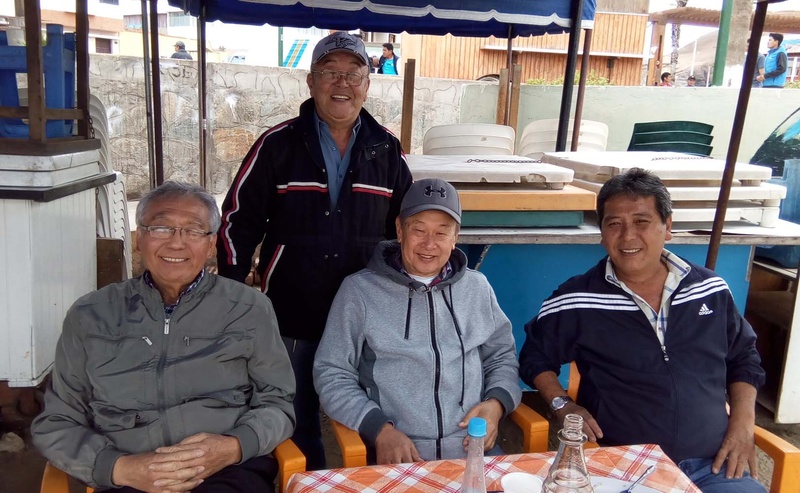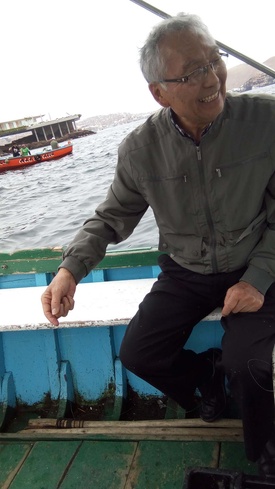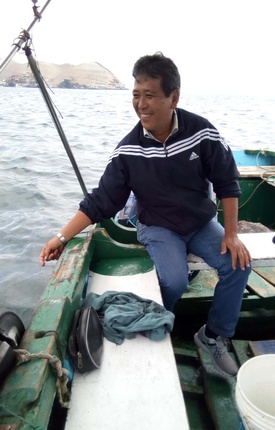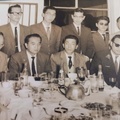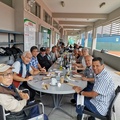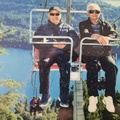November is the month for fishing for tramboyos, those big heads the color of ripe mango that hide among the sand, stones and rocks. And as Pedrito Luna said: “Luchito, Luchito, the best tramboyos come out in Pasamayito.” Those bugs that the Japanese like in soy sauce, parboiled and hot, white parchment rice. And my wife Susana told me that in the fifties her father Shigueto carried his three children and, in the Santa Catalina square, took the bus to Pucusana. They traveled to kilometer 43 to buy the bait in charge of the boys and the father continued another kilometer with the mobility. The beach was the illusion of those three children who, with bait in hand, went down the slope in search of their father who was already taking his nap on the hot sand and the endless waves that died meters away from him.
The illusions of the sea are warm promises that burst into time and are made of the most varied waves, which die on the rocks and submerge from the cliffs, emerge on the cliffs or simply end up in the sand, in their fragile attempt to want to move forward. . There the elusive “very very” (crustacean that is used as bait) are found in soft baits and enchant the old fishermen, inserting them on the hook, holding them with red thread and throwing them as far as possible, and let the fish be with its cunning that bites and pulls, eats and hooks, fights and despairs; that invisible among the waters wants to reach its refuge where the stones and rocks are once again a salvation from the powerful pull of the fisherman.
Experienced fishermen say that fishing for sole is true fishing. Walk, find the pool, throw the line and roll it up so that the bait floats, feel the “sample” beat among the waves, or simply see the small lead shipwreck, the decayed hook, the buried magic and, immediately, throw it again. That is, again and again, as the hours pass, the kilometers traveled, the tame surroundings of a place only known to those who fish, the omen of looking for another place where the sole rests its size and longevity, and erring on the side of wisdom when The fish in its race for freedom eagerly seeks to break free from the hook, sink to the bottom or simply fight loyally.
We saw it on “El Chuncho” beach in Pisco. A morning where the clarity was a kind of dull glow. Julio Tawata took his line and immediately threw it over the crest of a wave. The “dry” was already beginning and the stones could be seen at the end of the cliffs, when he gave a cry of astonishment and joy when he hooked a fish at such a distance. early hour and as soon as we arrived at the place. We all kept our eyes on the fisherman's fight against his prey. A four-kilogram sole appeared between the mist and the gentle waves, there was no way to help the waters retreat and among the protruding stones the beautiful sole was fighting for its life. He let go and his entire figure moved with excitement, he looked for the liquid of his habitat and jumped between the stones waiting for the next wave that could save him. Armando Uema yelled at Julio: “Sit on the sole, don't let it go away and don't wait for the next wave.” Julio obeyed and sat on the stunned fish, got wet from the waist down, dropped the cigarette he was smoking, trembled with excitement for a few moments and caught his famous sole. We didn't have cell phones then, but the photo would now be a sample of how to catch a sole and, incidentally, take a bath sitting down and with clothes.
In the eighties, fishing was an adventure full of friendship for us. The days were endless searching for our fishing gear and forming a group to go in search of a winter night in the Santa María resort. We were kind of partners in winter, when we arrived at the Esmeralda Nautical Club. After five in the afternoon, the guard made us enter his facilities. We were only looking for the fishing spots, the rocks and cliffs, the bridge and the island, in the opposite place, behind the Fernandini family residence.
We climbed the stairs, skirted the hill and went down to find a small wooden bridge. On the other side, a tiny island facing the wide sea, its paved floor and a grotto-like appearance invited us to fish all night, as if we were in the patio of our houses. At the final edge of its surroundings, an abandoned bathroom showed us the concrete roof, lifted from its place by a strong wave of the kind often experienced on sea coasts. He brought a primus (portable stove) with a pot, ladle and plates and, at the beginning of the night, any fish that came out on the lines arrived directly at their destination. The most exquisite and tasty sweat of the entire winter. It was accompanied by shrimp taken from the dock, eels from the small beach and snails from the assortment of their rocks. If something was missing, the very very soft ones would be the companions of the delicious sweat; pisco and rum were always present, and a Coleman t-shirt lamp gave us a beautiful view on a dark fishing night.
In the distance, we could see the flickering lighting of the Pucusana spa. We were on the winter route for years. By summer, the real partners were doing their thing. Parties at the club, yachts on trips, umbrellas on the small beach and we passed by Santa María, heading to Pasamayito or the beaches of Pisco. The guardian invited us to go in winter, he felt accompanied and at night with a bonfire and everything. He told us: “I was in the war with Chile,” and the short drink burned our throats with emotion.
A year ago, fishing was no longer on the beaches, rocks, cliffs and the excitement of the rough sea, but by boat and in the calm waters of Pucusana. Miguel Hosaka, Teruo Okuma, Daniel Kuriyama, 'El surdo' Nakaya and me. We pretended to be on the high seas and had a way to catch bass, parakeets, cojinovitas or fish weighing two kilos or more. Vain attempt and calm uncertainty. Our “catch” were samples of little fish for key chains. The pull was barely a tickling sensation and Danielito Kuriyama's professional rod was an example of how big fish were the story of the summers that passed. Only the breeze of a calm sea invited us to eat a ceviche of silversides in the many fast and tasty food places.
The port of Pucusana was no longer the same as it was in the sixties. Clean, orderly and with boats that invited you to feel the pull of horse mackerel, mackerel, cabinzas and tramboyos. Today, the “La Espiga” bakery is one of the many stores accumulated, and I only remembered that in front of the square in a rental building Pepe Cipolla, the great singer of the New Wave of the 60s and 70s, in the company of his parents, he lent the bathrooms to my sister Juana and my cousin Lili. They were clients of the Bolívar farm in the days it operated within the perimeter of the Stella Maris Clinic in Pueblo Libre.
At the beginning of the 70s, and in the new Vivanco store, one afternoon, almost close to closing, a fisherman friend showed up and told me: “Lucho, give me chicken intestine before you throw it away.” “Chicken tripe? What do you wanted for?". “To fish, using it as bait in Conchán, silversides are falling with chicken guts.” When the friend left with his belly, my sister approached me and said: “What if after closing we go to Conchán to fish?”
An hour and a half later we were on Conchán beach throwing the lines. My sister had no experience casting the line with its four hooks, sinker and bait and, in one of those, her line got stuck and she hit the sinker squarely in the forehead. The wound was bleeding, but she didn't have time to clean it, she had already caught several silversides and she couldn't lose her excitement over a simple wound. An hour later, the wound was still bleeding, I wrapped my fishing line and got serious. “Juana, let's go to the medical post, your wound is still bleeding.” Reluctantly, he left the fishing and we headed to the post.
Illusions are recorded in memory however one wants to remember them. The sea will always have a way of giving us experiences. And the castle, which we built with our memories when we were old and tired, will be the moments of living at peace with oneself and in complete solitude. The sea will be the envy of our dreams.
© 2020 Luis Iguchi Iguchi


